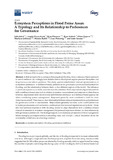| dc.contributor.author | Baird, Julia | |
| dc.contributor.author | Dzyundzyak, Angela | |
| dc.contributor.author | Plummer, Ryan | |
| dc.contributor.author | Bullock, Ryan | |
| dc.contributor.author | Dupont, Diane | |
| dc.contributor.author | Jollineau, Marilyne | |
| dc.contributor.author | Kubik, Wendee | |
| dc.contributor.author | Pickering, Gary | |
| dc.contributor.author | Vasseur, Liette | |
| dc.date.accessioned | 2018-05-29T15:55:22Z | |
| dc.date.available | 2018-05-29T15:55:22Z | |
| dc.date.issued | 2016 | |
| dc.identifier.citation | Baird, J., A. Dzyundzyak, A, R. Plummer, R. Bullock, D. Dupont, M. Jollineau, W. Kubik, G. Pickering and L. Vasseur. "Ecosystem perceptions in flood prone areas: A typology and its relationship to preferences for governance." Water 8(5) (2016): 191. DOI:10.3390/w8050191. | en_US |
| dc.identifier.issn | 2073-4441 | |
| dc.identifier.other | | |
| dc.identifier.uri | http://hdl.handle.net/10680/1496 | |
| dc.description.abstract | A shift appears to be occurring in thinking about flooding, from a resistance-based approach to one of resilience. Accordingly, how stakeholders in flood-prone regions perceive the system and its governance are salient questions. This study queried stakeholders’ internal representations of ecosystems (resistance- or resilience-based), preferences for governance actors and mechanisms for flooding, and the relationship between them in five different regions of the world. The influence of personal experience on these variables was also assessed. Most respondents aligned themselves with a resilience-based approach in relation to system connectedness and response to disturbance; however, respondents were almost evenly split between resistance- and resilience-based approaches when considering system management. Responses generally were considered to hold for other disturbances as well. There was no clear relationship between internal representations and preferences for governance actors or mechanisms. Respondents generally favoured actor combinations that included governments and mechanism combinations that included regulations and policies. Those
who had personal experience with flooding tended to align themselves with a resilience-based internal representation of system management, but personal experience showed no clear relationship with governance preferences. The findings support an evolutionary perspective of flood management where emerging paradigms enhance preceding ones, and prompt a critical discussion about the universality of resilience as a framing construct. | en_US |
| dc.description.sponsorship | Financial support for the CADWAGO project from Riksbankens Jubileumsfond, the Volkswagen Stiftung and Compagnia di San Paolo through the Europe and Global Challenges programme, as well as the Swedish Civil Contingencies Agency (MSB). | en_US |
| dc.description.uri | https://www.mdpi.com/2073-4441/8/5/191 | |
| dc.language.iso | en | en_US |
| dc.publisher | MDPI AG, Basel, Switzerland | en_US |
| dc.rights | info:eu-repo/semantics/openAccess | |
| dc.subject | ecosystem perception | en_US |
| dc.subject | flooding | en_US |
| dc.subject | governance | en_US |
| dc.subject | resilience | en_US |
| dc.title | Ecosystem Perceptions in Flood Prone Areas: A Typology and Its Relationship to Preferences for Governance | en_US |
| dc.type | Article | en_US |
| dc.rights.license | CC BY | |
| dc.identifier.doi | 10.3390/w8050191 | |

